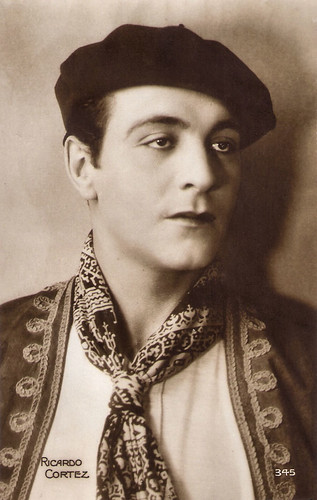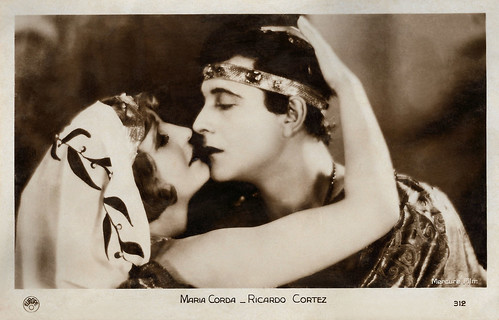
Italian postcard, no. 757. Photo: Films Paramount, Roma. Ricardo Cortez in Argentine Love (Allan Dwan, 1924). Italian release title: Amore Argentino.

Austrian postcard by Iris Verlag, no. 985. Photo: Fanamet / Paramount-Film. Ricardo Cortez in The Spaniard (Raoul Walsh, 1925).

American Arcade postcard by Ex. Sup. Co., Chicago. Ricardo Cortez in The Pony Express (James Cruze, 1925).

French postcard by Editions Cinémagazine, no. 345. Photo: MGM. Ricardo Cortez in Torrent (Monta Bell, 1926).

Austrian postcard by Iris Verlag, no. 5392. Photo: Austring Film-Verleih.
An unwilling Latin Lover by the name of Jacob Krantz
Italian Wikipedia claims that Ricardo Cortez, born as Jacob Krantz or Kranze, was a Jewish Austrian man, born in 1899 in Vienna, and emigrated to New York in 1900, but English Wikipedia and IMDb contest this and claim he was born in New York City in 1900 from emigrated Austrian-Jewish parents. Anyway, young Jacob Krantz worked as a runner on Wall Street before entering the film business around 1917 and had his first (uncredited) parts in Californian productions from 1919. Krantz's first credited part was in the Paramount comedy Sixty Cents an Hour (Joseph Henabery, 1923) with Jacqueline Logan and Walter Hiers.
As Krantz started in Hollywood when Rudolph Valentino was at the peak of his popularity, the Teutonic Jacob Krantz was transformed by Paramount into the Spanish Ricardo Cortez. IMDb even claims Jesse Lasky at Paramount deliberately replaced Valentino with Cortez as the former had become too 'difficult and demanding'. All through the silent era, Ricardo Cortez remained at Paramount and acted in some 5 to 7 films a year. Even if Cortez was not often the star of the film, he was often among the three or four most prominent actors of the film, as in Children of Jazz (Jerome Storm, 1923) with Eileen Percy, The Next Corner (Sam Wood, 1924) with Dorothy Mackaill, A Society Scandal (Allan Dwan, 1924) with Gloria Swanson, and The Bedroom Window (William DeMille, 1924) with May McAvoy and Malcolm McGregor.
Top-billing, Cortez got in The City That Never Sleeps (James Cruze, 1924) opposite Louise Dresser, the Warner production This Woman (Phil Rosen, 1924) opposite Irene Rich, and a growing number of Latin Lover parts, as in Argentine Love (Allan Dwan, 1924) with Bebe Daniels, and The Spaniard (Raoul Walsh, 1925) with Jetta Goudal. Paramount attempted to turn Cortez into another Latin Lover, but the tall, dark young Cortez did not want to be restricted to that type. Yet, he still often had to play many romantic partners of the leading female stars of the day, e.g. opposite Frances Howard in The Swan (1925), opposite Betty Bronson in the period piece Not So Long Ago (1925), and opposite Greta Nissen in In the Name of Love (1925).
Ricardo Cortez starred as Jack Weston opposite Betty Compson, Ernest Torrence, Wallace Beery and George Bancroft, in the Paramount Western The Pony Express (James Cruze, 1925), billed at the time as "The Rockies and Sierras, sunshine and snow, love and hate, men and beasts, war and peace - all rolled into a character picture which will never be duplicated."
In his next film, he was the male lead opposite Greta Garbo and Gertrude Olmstead in the MGM/Cosmopolitan production Torrent (Monta Bell, 1926). For Garbo, it was her first film in Hollywood, but the film was draped around her star persona and character as a Spanish temptress, while Cortez, despite his Valentino stand-in aura "did something that few romantic stars of the day ever would have done in a film: allow himself to look unattractive, appear foolish and to grow old ungracefully" (TuckMN on IMDb). The splendid cinematography was done by William Daniels, who would do 20 films with Garbo. After this sidestep at MGM, Cortez returned to Paramount, where he continued to star in such films as The Cat's Pajamas (William Welman, 1926) with Betty Bronson, The Sorrows of Satan (D.W. Griffith, 1926) with Carol Dempster and Adolphe Menjou, and New York (Luther Reed, 1927).

French postcard by Europe, no. 312. Photo: Mercure Film / First National. Maria Corda and Ricardo Cortez in The Private Life of Helen of Troy (Alexander Korda, 1927).

French postcard by Europe, no. 313. Photo: Mercure Film / First National. Maria Corda and Ricardo Cortez in The Private Life of Helen of Troy (Alexander Korda, 1927).

French postcard by Europe, no. 314. Photo: Mercure Film / First National. Ricardo Cortez as Paris in The Private Life of Helen of Troy (Alexander Korda, 1927).

American postcard by California Greeting & Post Card Co., Los Angeles, no. 30508 N. Sent by mail in 1928. Caption: Ricardo Cortez, Paramount Player, in the Driveway of his Hollywood Home, Los Angeles, California.

Italian postcard by Ebany, no. 18.
Developing a new type as the womanising tough guy
Apparently, Ricardo Cortez stopped his contract at Paramount in 1927, as he then started to freelance for various companies. He starred opposite the great Lon Chaney in the MGM film Mockery (Benjamin Christensen, 1927), opposite Maria Corda in First National's Antiquity film spoof The Private Life of Helen of Troy (Alexander Korda, 1927), and even opposite Louise Lagrange in the French film La danseuse Orchidée/Woman of Destiny (Léonce Perret, 1928).
In La danseuse Orchidée/Woman of Destiny, Luicha (Lagrange) returns to her native village in the Basque country where she meets her childhood friend Yoannès (Cortez). The latter, madly in love, wants to marry her, but she disappears suddenly. She has returned to Paris precipitately where she is known as 'the Orchid Dancer'. He starts searching for her and discovers her profession. Interestingly, the film is not focusing on Lagrange but on Cortez, who managed to show he was capable of all kinds of subtleties in his performance, expressing jealousy, impulsiveness, and fragility. Returned to Hollywood, Cortez played in his first part-talkie, Ladies of the Night Club (George Archainbaud, 1928), still without spoken dialogue. In his last silent films, Cortez developed a new type, to which he would hold on in the early 1930s as well: that of the womanising tough guy and even the gangster, so no longer the romantic partner of the female stars. The tide had changed and so had types 'en vogue' in the Pre-Code movies of the late 1920s and early 1930s.
Cortez does not seem to have had a big problem with stepping over to sound cinema, but his age was a bit counting. That was even worked into the plots of some of his early 1930s sound films, such as Midstream (James Flood, 1929). Still, in the early 1930s, Cortez remained highly active, doing even ten films in 1931, including Ten Cents a Dance (Lionel Barrymore, Edward Buzzell, 1931) with Barbara Stanwyck as a taxi dancer. He was even Sam Spade in the first film adaptation of Dashiell Hammett's novel 'The Maltese Falcon', directed by Roy Del Ruth in 1931, and with Bebe Daniels as Ruth Wonderly, the part which would make Mary Astor a star in the later version with Bogart. In 1931 Cortez often acted opposite Astor in films such as Behind Office Doors (Melville Brown, 1931).
Until the end of 1936, Ricardo Cortez had a very active career, acting in between 5 to 8 films per year, and in addition to parts as antagonists, he was still the star of several films such as Men of Chance (George Archainbaud, 1931), the gangster movie Bad Company (Tay Garnett, 1931), the melodrama Symphony of Six Million (Gregory La Cava, 1932), the thriller The Big Shakedown (1934) alongside Bette Davis, and the detective story Mr. Moto's Last Warning (Norman Foster, 1939). All in all, Cortez played in some 100 films. Between 1939 and 1940, he tried to go into directing, with a series of B-movies intended for double-bill shows, but his attempts behind the camera had disappointing results. During the 1940s he progressively thinned his film appearances, appearing again in the Film Noir The Locket (John Brahm, 1946) and Mystery in Mexico (Robert Wise, 1948).
After that, Cortez returned to Wall Street and became a respected broker. He allowed himself a return to the set solely for a role in John Ford's drama The Last Hurrah (1958) and for an appearance in an episode of the television series Bonanza (1960). Ricardo Cortez was married to actress Alma Rubens in 1926, until her early death in 1931 because of pneumonia. In 1934 he married Christine Coniff Lee, which ended in a divorce in 1940. His last wife was Margaret Belle, who was with him till his death in 1977. His brother was cinematographer Stanley Cortez, who also changed his original name, Samuel Krantz, and who was responsible for the masterly cinematography of The Magnificent Ambersons (Orson Welles, 1942) and The Night of the Hunter (Charles Laughton, 1955).

French postcard by Editions Cinémagazine, no. 222.

French postcard by Editions Cinémagazine, no. 341.

German postcard by Ross Verlag, no. 1524/1, 1927-1928. Photo: Parufamet.

German postcard by Ross Verlag, no. 1835/1, 1927-1928. Photo: Paramount / Fanamet. Ricardo Cortez in The Sorrows of Satan (D.W. Griffith, 1926).

German postcard by Ross Verlag, no. 1835/2, 1927-1928. Photo: Fanamet.

German postcard by Ross Verlag, no. 3262/1, 1928-1929. Photo: Paramount.

German postcard by Ross Verlag, no. 3398/1, 1928-1929. Photo: Defina / First National.

British postcard in the Picturegoer Series, London, no. 214a.
Sources: Ann Hardings Treasures, Wikipedia (English and Italian), and IMDb.
This post was last updated on 17 October 2023.
No comments:
Post a Comment